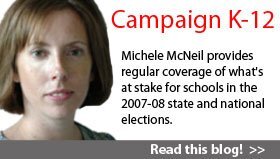Education won’t be any more prominent in the general-election campaign than it has been during the presidential primaries, said two of the three panelists at a symposium at the American Enterprise Institute in Washington last week.
“This is the first time since 1980 or ’84 that education has not loomed large, or at least largish, as a presidential campaign issue,” said Chester E. Finn Jr., the president of the Thomas B. Fordham Foundation and a former Department of Education official under President Reagan. “If any of today’s candidates thought education was a winning issue, or even an important issue, I think we’d know it by now.”
William A. Galston, a senior fellow at the Brookings Institution who was an adviser to President Clinton, said, “Not only has education not been a big issue in this presidential year, it’s not going to be,” with “peace and prosperity” issues dominant in the campaign.
Mr. Finn said people may have grown generally exasperated with talk of education reform in presidential elections. Or they may have figured out “that education is no longer a winning issue because when all is said and done, a president doesn’t have that much leverage over the schools,” he said.

The dissenter was Marc S. Lampkin, the executive director of Strong American Schools, which is running the “ED in ’08” campaign to push education as an election issue. (“Effort for Education as Campaign Issue Fights for Traction,” Dec. 5, 2007.)
While polls have shown that education is, at best, in the middle of the pack as a voter concern this year, the group’s own surveys show that “education is the number-one issue for Hispanics,” he said.
Panelists at the March 3 event, held a day before Sen. Hillary Rodham Clinton of New York won the Democratic primaries in Ohio, Rhode Island, and Texas, discussed the effect the election might have on the No Child Left Behind Act.
Mr. Galston, who worked on the 1994 reauthorization of the Elementary and Secondary Education Act (of which NCLB is the 2001 version), said, “If there is a Democratic president, I don’t think that NCLB will survive in anything like its current form.”
The law faces better odds if Sen. John McCain, R-Ariz., wins, the panelists said.








